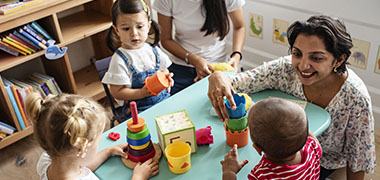
Unfortunately, we currently have no courses available to show you
Common questions
The average salary for Child Psychologists in Australia is $104,000 per annum. These are median figures for full-time employees and should be considered a guide only.
 Courses.com.au Team
Courses.com.au Team
There are approximately 1,200 specialist psychologists working in Australia right now, some of these are Child Psychologists. They are employed by schools, hospitals, community health organisations, NGOs, and government organisations. Many Child Psychologists work independently through their own private practice.
 Courses.com.au Team
Courses.com.au Team
To become a Child Psychologist you must complete a Bachelor’s degree in psychology approved by the Australian Psychology Accreditation Council (APAC). Examples include: Bachelor of Arts (Psychology), Bachelor of Psychology, Bachelor of Psychological Science, and Bachelor of Science (Psychology). Choose child protection, human development, attachment disorders, trauma, and family counselling electives. The next step is to become a fully registered Clinical Psychologist. This involves completing a Master of Psychology (Clinical Psychology), undertaking a one-year internship, and then passing the National Psychology Exam. Finally, you’ll need post-graduate studies to specialise in Child Psychology. Suitable qualifications include the Graduate Diploma of Counselling (Child, Youth & Family Therapy) or Master of Child and Adolescent Mental Health.
Source: Australian Government Labour Market Insights 2023
 Courses.com.au Team
Courses.com.au Team
Related career opportunities
Browse occupations related to Child Psychologist
Further reading


What is the Difference Between a Psychologist and Psychiatrist?
25th October 2022
5 jobs for people who like working with children
31st August 2021All child psychologist courses
Child Psychologist careers
If you're considering a career as a Child Psychologist, enrolling in Child Psychologist courses in Bundaberg can set you on the right path. These courses provide the essential knowledge and skills needed to support children's mental health and wellbeing. Bundaberg offers various training providers that are registered and recognised, ensuring you receive quality education that meets industry standards. The courses often integrate key subjects such as Community Services, Healthcare, and Psychology, which are crucial for any aspiring Child Psychologist.
In addition to the foundational knowledge, these courses also explore related job roles that could interest you, such as becoming a Student Counsellor or a Mental Health Worker. Other roles like Family Support Worker and Youth Support Worker are also integral in creating a supportive environment for children and families in Bundaberg. These complementary roles are often essential in collaborating with Child Psychologists to provide holistic care.
Furthermore, Bundaberg's strong community spirit enhances the practical learning experience through fieldwork and placements. By pursuing Child Psychologist courses in Bundaberg, you'll not only gain valuable qualifications but also connect with local organisations focused on child welfare, youth, and family intervention, such as Child Welfare, Youth and Family Intervention. Explore the various training routes and pathways available to you and embark on a rewarding career dedicated to making a positive impact on the lives of children and families in the Bundaberg region.
